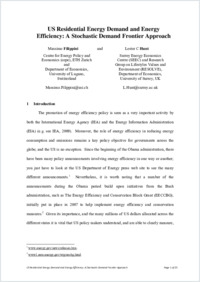US residential energy demand and energy efficiency : a stochastic demand frontier approach
- Filippini, Massimo Istituto di economia politica (IdEP), Facoltà di scienze economiche, Università della Svizzera italiana, Svizzera
- Hunt, Lester C. Surrey Energy Economics Centre (SEEC) and Research Group on Lifestyles Values and Environment (RESOLVE), Department of Economics, University of Surrey, United Kingdom
-
2012
Published in:
- Energy economics. - Elsevier. - 2012, vol. 34, no. 5, p. 1484–1491
English
This paper estimates a US frontier residential aggregate energy demand function using panel data for 48 ‘states’ over the period 1995 to 2007 using stochastic frontier analysis (SFA). Utilizing an econometric energy demand model, the (in)efficiency of each state is modelled and it is argued that this represents a measure of the inefficient use of residential energy in each state (i.e. ‘waste energy’). This underlying efficiency for the US is therefore observed for each state as well as the relative efficiency across the states. Moreover, the analysis suggests that energy intensity is not necessarily a good indicator of energy efficiency, whereas by controlling for a range of economic and other factors, the measure of energy efficiency obtained via this approach is. This is a novel approach to model residential energy demand and efficiency and it is arguably particularly relevant given current US energy policy discussions related to energy efficiency.
- Language
-
- English
- Classification
- Economics
- License
-
License undefined
- Open access status
- green
- Identifiers
-
- RERO DOC 29740
- DOI 10.1016/j.eneco.2012.06.013
- ARK ark:/12658/srd1318436
- Persistent URL
- https://n2t.net/ark:/12658/srd1318436
Statistics
Document views: 202
File downloads:
- Texte intégral: 516
